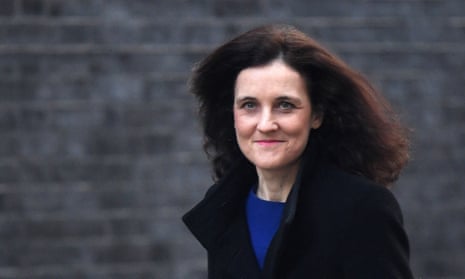A former environment secretary has revealed she has shares worth more than £70,000 in Shell that she did not disclose as required for more than five years.
Theresa Villiers was the secretary for environment, food and rural affairs from July 2019 until February 2020, but only this week disclosed she has had investments worth more than £70,000 each in Shell and the drinks company Diageo since February 2018. Villiers also disclosed shares worth more than £70,000 in Experian, held since July 2019, and in an investment trust, RIT Capital Partners.
Her disclosure follows revelations in the Guardian of the scores of MPs who held shares that were, in effect, secret. House of Commons rules require MPs to disclose all shareholdings in a single company that are worth more than £70,000.
A spokesperson for Villiers said she deeply regretted her “failure to monitor the value of shareholdings and has offered her sincere apologies”, adding that the shares were professionally managed and she did not take day-to-day investment decisions.
The spokesperson added: “It did not occur to her that any single shareholding would reach the threshold for declaration, but a legacy received in 2018 caused that to happen. As soon as she realised this, she alerted the registrar of members’ interests and the standards commissioner.
“She takes full responsibility for the mistake. She accepts that it should never have happened, and that she should have kept track of the additions to her investment portfolio. She is taking steps to ensure that this never happens again. Nothing she has ever said or done as an MP has been influenced by these shareholdings.”
Villiers’ late declaration of her interests could place her in breach of the House of Commons code of conduct, and raises questions about the £70,000 threshold for registering interests.
Q&AWhat are the transparency rules for MPs' shareholdings?
Show
MPs must register their earnings and financial interests. These registers are published and allow the public to see any potential conflicts of interest.
However, MPs need only register holdings they have in a company, including if it is jointly owned, when their share is more than 15% or when the holding is worth more than £70,000 as of the beginning of April.
If a shareholding is below the threshold but might “reasonably be thought by others to influence a member’s actions”, it must be registered.
There is no requirement to register dividend income.
Separately MPs must declare interests that could reasonably be thought to influence their parliamentary actions such as speaking in a debate. In these instances they are expected to declare indirect financial interests including those of a family member.
Ministers are required to disclose all their interests “which might be thought to give rise to a conflict” to their permanent secretary. This includes the interests of close family members. There is no threshold for disclosure. The independent adviser on ministers' interests determines which interests need to be declared publicly.
It also raises further questions about the procedures used to determine if ministers’ interests should be publicly disclosed.
Despite Villiers’ ministerial role, her interest in Shell was not disclosed in the list of ministers’ interests, published by the Cabinet Office with the assistance of the prime minister’s independent adviser on ministers’ interests.
During Villiers’ time in post, the European Commission contacted her to complain about Shell’s plans, backed by the government, to leave parts of its decommissioned oil rigs in the North Sea.
Villiers’ spokesperson said she had disclosed to Defra that she had a portfolio of shares upon her appointment and she offered to place the shares into a blind trust.
after newsletter promotion
The spokesperson said: “The prime minister’s ethics adviser said that this step was unnecessary because the portfolio was managed for her and she did not take investment decisions. So ministerial code requirements were complied with. Nothing she did as Defra secretary was influenced by any of these shareholdings.”
Dr Susan Hawley, the executive director of Spotlight on Corruption, said: “It’s good to see parliamentarians getting more serious about disclosing shareholdings, in light of the Guardian’s work on this. However, it is alarming that the independent adviser at the time did not think that shareholdings in companies which related directly to a ministerial remit were worth declaring.
“This should prompt a real rethink across the board about how important it is that MPs and ministers accurately report shareholdings in their declarations in order to prevent the potential for direct conflicts of interest. We also desperately need a proper debate about whether the threshold for shareholding declarations is currently set far too high.”
Parliamentarians’ registration of their shareholdings faces further challenges, with plans being discussed in the House of Lords to double the threshold there for registration from £50,000 to £100,000.
